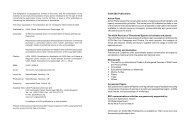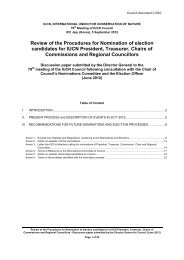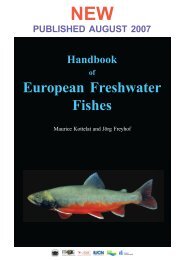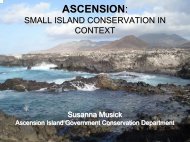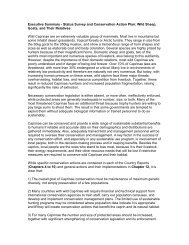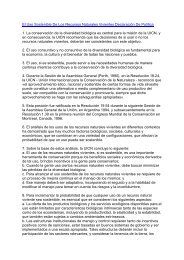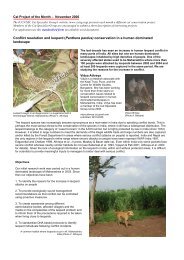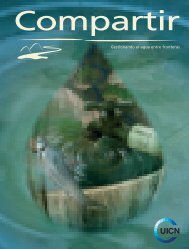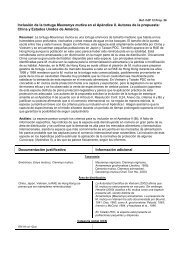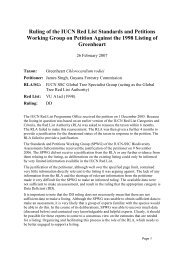Planning education to care for the earth - IUCN Knowledge Network
Planning education to care for the earth - IUCN Knowledge Network
Planning education to care for the earth - IUCN Knowledge Network
You also want an ePaper? Increase the reach of your titles
YUMPU automatically turns print PDFs into web optimized ePapers that Google loves.
Zambia: environmental <strong>education</strong>Institue and <strong>IUCN</strong> have worked <strong>to</strong>ge<strong>the</strong>r <strong>to</strong> train broadcasters from <strong>the</strong>Sou<strong>the</strong>rn African Development Community (SACD) region.As a result, coverage of environmental issues by <strong>the</strong> media - both print andelectronic - has improved. More needs <strong>to</strong> be done, however, in particular <strong>for</strong>rurally-based journalists.Need <strong>for</strong> a strategyA strategy <strong>for</strong> environmental <strong>education</strong> has developed slowly in Zambia andmuch remains <strong>to</strong> be done. A fully-articulated policy on <strong>the</strong> environment has<strong>to</strong> be drawn up by <strong>the</strong> government, with a policy <strong>for</strong> environmental <strong>education</strong>which would serve as <strong>the</strong> basis of a strategy. (Zambia has some way <strong>to</strong> go inimplementing <strong>the</strong> “Caring <strong>for</strong> <strong>the</strong> Earth” document and Agenda 21 adoptedat <strong>the</strong> World Conference on Environment and Development, which wouldserve as a guide <strong>for</strong> an expanded programme of environmental <strong>education</strong>).Government Departments dealing with resources - <strong>for</strong> example, <strong>the</strong>Departments of Water, Energy and Lands - should make a concertedcontribution <strong>to</strong> <strong>the</strong> development of environmental <strong>education</strong>. There is a need<strong>for</strong> coordination of policies relating <strong>to</strong> environmental and natural resourcesissues among Ministries.Environmental <strong>education</strong> lacks trained manpower at <strong>the</strong> primary, secondaryand teacher training levels and funding <strong>for</strong> all aspects of <strong>the</strong> programmeneeds <strong>to</strong> be increased.Gaps and priorities need <strong>to</strong> be set in relation <strong>to</strong> target groups; few activitiesreach women and youth. A strategy requires <strong>the</strong> development of methodsand techniques of educating all <strong>the</strong> target groups, accompanied by <strong>the</strong>design, development, printing and distribution of appropriate teachingmaterials. Techniques which give an inter-disciplinary or multi-disciplinarycharacter <strong>to</strong> subjects in <strong>the</strong> curriculum have <strong>to</strong> be worked out.There is a need <strong>for</strong> NGOs <strong>to</strong> coordinate <strong>the</strong>ir environmental <strong>education</strong>activities.Finally, <strong>the</strong>re is an overriding need <strong>for</strong> a national coordination ofenvironmental <strong>education</strong>.Demonstrating <strong>the</strong> benefitsThe aims of environmental <strong>education</strong> - creating awareness, changingattitudes, giving individuals and communities knowledge of <strong>the</strong> environment,equipping <strong>the</strong>m with skills <strong>to</strong> identify and solve environmental problems,and mobilizing popular participation - call <strong>for</strong> a prior understanding ofcurrent perceptions. In its work with teachers, ZEEP has tried <strong>to</strong> establishwhat people say, do, and think but do not express about <strong>the</strong> environment. Anindication of some of <strong>the</strong> perceptions <strong>the</strong> <strong>education</strong> programme has <strong>to</strong> work151



